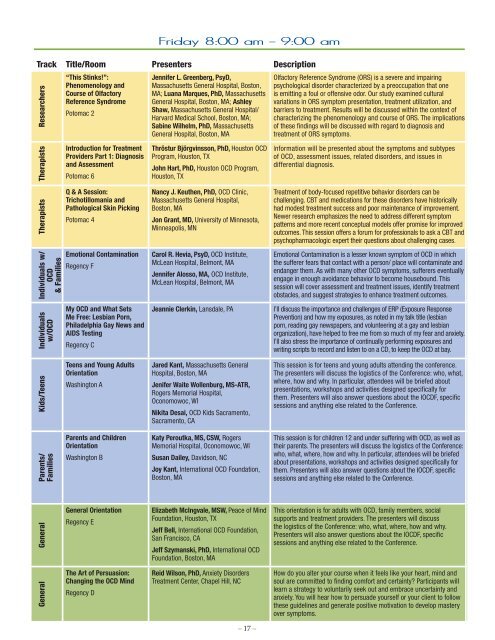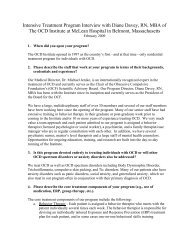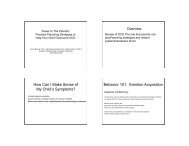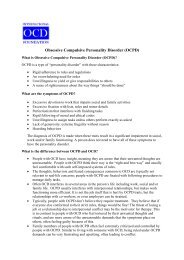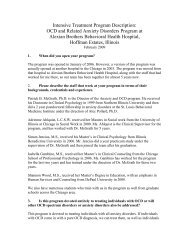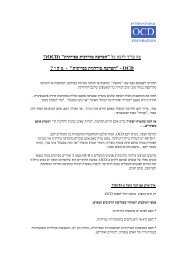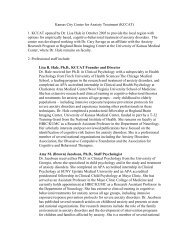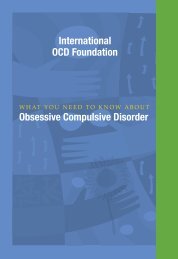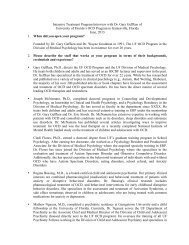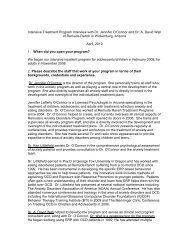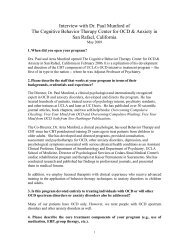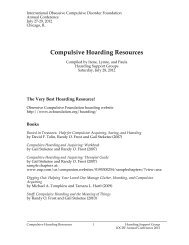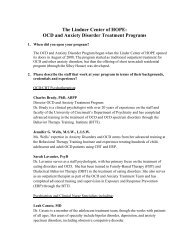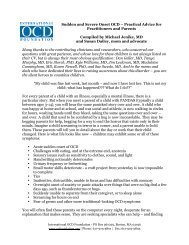Friday 8:00 am â 9:00 am - Obsessive Compulsive Foundation
Friday 8:00 am â 9:00 am - Obsessive Compulsive Foundation
Friday 8:00 am â 9:00 am - Obsessive Compulsive Foundation
Create successful ePaper yourself
Turn your PDF publications into a flip-book with our unique Google optimized e-Paper software.
<strong>Friday</strong> 9:15 <strong>am</strong> – 10:45 <strong>am</strong>Track Title/Room Presenters DescriptionResearchersTherapistsTherapistsA Novel TreatmentFor Late LifeHoardingPotomac 2IntroductionFor TreatmentProviders Part 2:Treatment OptionsPotomac 6ERP Gone Wild:Innovative Ideasfor ExposureExercisesPotomac 4Catherine Ayers, PhD, ABPP, Universityof California, San Diego, CA; ChristianaBratiotis, PhD, LCSW, Boston UniversitySchool of Social Work, Boston, MA;Sanjaya Saxena, MD, UCSD OCDProgr<strong>am</strong>, San Diego, CAThröstur Björgvinsson, PhD,Houston OCD Progr<strong>am</strong>, Houston, TXS. Evelyn Stewart, MD, MassachusettsGeneral Hospital, Boston, MAJason Spielman, PsyD, NeuroBehavioralInstitute, Weston, FLMarilyn Cugnetto, PhD, NeuroBehavioralInstitute, Weston, FLJonathan Hoffman, PhD, ABPP,NeuroBehavioral Institute, Weston, FLThis presentation will be presented in 3 parts, followed by discussion andquestions from the audience. Part 1 will review the findings of a psychotherapyoutcome study ex<strong>am</strong>ining 12 older adults with hoarding that was funded bythe IOCDF. Part 2 will consist of a brief overview of compulsive hoarding andqualitative data on a pilot study investigating treatment response in older adultswith hoarding. Part 3 will present a novel treatment for older adults aimed at<strong>am</strong>eliorating cognitive deficits.Information will be presented about first line treatments in OCD includingmedication options and Exposure and Response Prevention Therapy. In addition,adjunct therapies (group therapy, skills training, etc.) will be discussed.This is a hands-on experiential workshop. The speakers will engage participantsin a series of activities designed to stimulate and expand their thinking aboutERP. This includes decisions about symptom selection, choice of settings, use ofprops, when and when not to use humor, and other important variables. Duringthe course of the workshop’s activities, participants and speakers will interactto brainstorm their ideas, discuss their own cases, and troubleshoot commonpitfalls in conducting ERP.Ind. w/OCD& F<strong>am</strong>iliesOCD 101 forConsumers andF<strong>am</strong>iliesRegency CBruce Mansbridge, PhD, Austin Center forthe Treatment of OCD, Austin, TXThis basic but thorough “course” covers information that people with OCD andtheir f<strong>am</strong>ilies need to know. Attendees will experience optical illusions and avisual hallucination as part of learning how the brain processes information,which can help us understand how a neurological glitch can lead to theperceptual and cognitive distortions that underlie obsessions. We’ll also coverhow medications and CBT work, and have time for Q & A.Individualsw/OCDStrategies forIncreasingMotivationRegency FJeff Szymanski, PhD, International OCD<strong>Foundation</strong>, Boston, MAJeff Bell, International OCD <strong>Foundation</strong>,San Francisco, CAThis will be an experiential workshop for individuals with OCD. The specificstrategies discussed will include working on attitudes of accepting negative internalexperiences rather than avoiding them, modifying problem solving strategies,focusing on your “Greater Good,” and using your value system as a decision makerrather than emotions. Those attending this workshop will be asked to completeworksheets and are encouraged to actively participate in the discussion.Kids/TeensI’m So OCD AboutThat!Washington ALori J. Kasmen, PsyD, Anxiety andAgoraphobia Treatment Center, BalaCynwyd, PAPatrick A. Aloia, Manhasset, NYAn open (but private) discussion of real life issues of teens/young adults withOCD - friends, relationships, being popular, confidence, tests, grades, gettinginvolved, parents, siblings, college, and meds. How are normal issues affectedby the fear, the anxiety and the discomfort with uncertainty brought about byOCD? The format will invite discussion from all participants.Parents/F<strong>am</strong>iliesUnderstandingHow OCDManifests inChildren toImprove F<strong>am</strong>ilyInteractionPatternsJenny C. Yip, PsyD, Renewed FreedomTreatment Center, Los Angeles, CASymptoms of OCD in children often manifest in different ways, which can leadto harmful misdiagnoses. Clinicians, f<strong>am</strong>ily members, and/or school personnelare quick to label inattentiveness as ADHD without taking the root cause intoconsideration. Targeting the correct cause can prevent long-term difficulties atschool and home for the child, and minimize frustration for parents and othercaretakers. Understanding the underlying triggers of OCD in children is the firststep to gaining specific strategies for working with the child successfully.Washington BGeneralBeyond the Blues:OCD in Pregnancyand PostpartumRegency DJonathan S. Abr<strong>am</strong>owitz, PhD, Universityof North Carolina, Chapel Hill, NCKatherine M. Moore, MD, Mayo Clinic,Rochester, MNThis multidisciplinary (psychiatrist and psychologist) presentation will emphasizeboth the biological and psychological factors, which play a role in perinatalOCD. We will address the safety of medication use during pregnancy and thepostpartum. This presentation will be appropriate for people with OCD, f<strong>am</strong>ilymembers, those interested in research, as well as treatment providers lookingfor assistance with utilizing medication or doing CBT with those suffering frompostpartum OCD.GeneralProgress Reportfrom the OCDCollaborativeGeneticsAssociation(OCGAS) StudyGerald Nestadt, MD, MPH, Johns HopkinsUniversity Hospital, Baltimore, MDThe OCD Collaborative Genetics Association Study (OCGAS) has conducted agenome-wide linkage on 219 OCD f<strong>am</strong>ilies. The results of this study and othergenetic studies will be discussed with respect to the future promise that maycome from this line of research.Regency E– 18 –
<strong>Friday</strong> 1:30 pm – 3:30 pmTrack Title/Room Presenters DescriptionResearchersTherapistsUnderstanding& Treating BDD:Latest ResearchFindings onEtiologicalFactors, ClinicalCharacteristics &PharmacologyPotomac 2HoardingSymptoms andStrategies: MuchTo Do AboutSomething!Potomac 4Fugen Neziroglu, PhD, Bio-Behavioral Institute,Great Neck, NY; J<strong>am</strong>ie Feusner, MD, UCLA OCDIntensive Treatment Progr<strong>am</strong>, Los Angeles, CA;Michael Hickey, PhD, Albert Ellis Institute, NewYork, NY; Eric Hollander, MD, Mount Sinai School ofMedicine, New York, NY; Sony Khemlani-Patel, PhD,Bio-Behavioral Institute, Great Neck, NY; SabineWilhelm, PhD, Massachusetts General Hospital,Boston, MAChristiana Bratiotis, PhD, LCSW, Boston UniversitySchool of Social Work, Boston, MAJordana Muroff, PhD, LICSW, Boston UniversitySchool of Social Work, Boston, MABody Dysmorphic Disorder (BDD) requires a specialized treatmentapproach. This is due in part to high incidence of co-morbidity,hopelessness, suicidality, and high overvalued ideation. Furthermore,BDD symptoms appear to overlap with anxiety, mood, bodyimage, delusional, and personality disorders, making it a complexpsychological disorder. This symposium will provide the audiencewith a thorough understanding of BDD symptoms, present the latestresearch findings in the etiology of BDD, and offer guidelines forpsychological and pharmacological treatment.This workshop will briefly summarize the symptoms of hoarding asmodeled by Steketee & Frost. The presenters will discuss recentclinical research findings about hoarding behaviors and present <strong>am</strong>odel for understanding these symptoms. We will also summarizeinterventions for hoarding including motivational enhancement, caseformulation and goal setting, organizing and problem solving skills,changing beliefs about possessions, and removing clutter.TherapistsCatching andCuring OCD:An Overview ofPANDASPotomac 6Tori Page-Voth, PhD, University of Maryland, CollegePark, MD; Elizabeth Latimer, MD, GeorgetownMedical Center, Bethesda, MD; Beth Maloney, JD,PANDAS <strong>Foundation</strong>, Kennebunkport, ME; CatherineNicolaides, MD, South Jersey Healthcare, Marlton, NJThis presentation will provide an overview of PANDAS for thoseworking in the field of OCD. Panelists include two parents of childrenwith PANDAS-related OCD, and two doctors who have successfullytreated children with this illness.Ind w/OCD& F<strong>am</strong>iliesMedication: WhatDo I Need to Know?Regency FMichael A. Jenike, MD, OCD Institute, McLeanHospital, Belmont, MA; International OCD <strong>Foundation</strong>,Boston, MAIn this presentation, Dr. Jenike will discuss all aspects of medicationand its relationship to OCD. Questions from the audience areencouraged.Individualsw/OCDTaking the FirstStep: Developingand ERP HierarchyRegency CRobin Zasio, PsyD, The Anxiety Treatment Center;President, OCD Sacr<strong>am</strong>ento, Sacr<strong>am</strong>ento, CAPatrick McGrath, PhD, Alexian Brothers BehavioralHealth Hospital, Hoffman Estates, ILFelicity Sapp, PhD, Anxiety Psychological Services,Calgary, Alberta, CanadaThis workshop is designed to help OCD sufferers who are lookingto understand how ERP can work for them. This interactive andexperiential workshop will allow participants to break into smallgroups, work directly with a behavioral specialist, share personallysome of their OCD triggers, develop a hierarchy, and work to find thefirst step. This workshop will demonstrate the ERP process throughoffering a “hands on” approach, and provide a collaborative experiencein beginning to tackle the OCD bully.Kids/TeensStudy andOrganizationalSkills for Studentswith OCDWashington AMary Kathleen Norris, LPC, Answers for AnxietyCounseling, Bedford, TXThis workshop is designed to give a s<strong>am</strong>pling of the tools used tohelp kids with their goal of making school easier, faster, less trouble,and more fun. The majority of the tools described are aimed at middleschool, high school and college students, though some of the tools aredefinitely applicable to elementary school students as well.Parents/F<strong>am</strong>iliesTalk to the Experts:Q & A on PediatricOCDWashington BS. Evelyn Stewart, MD, Massachusetts GeneralHospital, Boston, MA; Jeanne F<strong>am</strong>a, PhD,Massachusetts General Hospital, Boston, MA;Martin E. Franklin, PhD, University of Pennsylvania,Philadelphia, PA; Fred Penzel, PhD, Western SuffolkPsychological Services, Huntington, NY; Eric Storch,PhD, University of South Florida Child & Adult OCDTreatment Progr<strong>am</strong>, St. Petersburg, FL; Barbara VanNoppen, PhD, University of Southern California, LosAngeles, CA; Aureen P. Wagner, PhD, University ofRochester School of Medicine, Rochester, NYThese experts want to hear about the pressing issues OCD-affectedkids and their f<strong>am</strong>ilies face. This panel session will give children,f<strong>am</strong>ilies and clinicians an opportunity to raise questions or issuesfor discussion pertinent to childhood OCD. The panel will includeexperts from the newly formed Pediatric OCD committee of the IOCDFScientific Advisory Board, including OCD clinicians and researcherswho focus on this age group.GeneralThe Bee Trap:Storytelling in theTreatment of OCDRegency DAllen H. Weg, EdD, Stress & Anxiety Services of NJ,OCD New Jersey, East Brunswick, NJThis session reviews how storytelling can help describe thephenomenological experience of OCD. A series of stories will be sharedand each story will be preceded or followed by an explanation of howthe story can be used in a therapy session, how it relates to OCD,and what specific aspect of OCD or its treatment is addressed. Whileentertaining and fun, this presentation provides a serious look at OCDfrom a unique perspective.GeneralTurning Points andHope: Lessons fromOur OCD SuccessStoriesRegency EJeff Bell, International OCD <strong>Foundation</strong>, Boston,MA; Jared Kant, Massachusetts General Hospital,Boston, MA; Elizabeth McIngvale, MSW, Peaceof Mind <strong>Foundation</strong>, Houston, TX; ShannonShy, Department of the Navy, Woodbridge, VA;Christopher Trondsen, Lakewood, CAThrough this 90-minute, moderated panel discussion, attendeeswill get answers from panelists uniquely qualified to weigh in - fiveindividuals with OCD who (with the help of professionals and lovedones) have seen their lives literally transformed.– 20 –
<strong>Friday</strong> 4:<strong>00</strong> pm – 5:30 pmTrack Title/Room Presenters DescriptionResearchersTherapistsTherapistsInd. w/OCD& F<strong>am</strong>iliesCurrent Trends in OCDF<strong>am</strong>ily Research -2010Potomac 2How Does it Workin Real Life? Askthe Experts AboutPractical Approachesto CBT andMedicationsPotomac 4“My Thoughts AreDriving Me Crazy!”- CBT Strategiesfor “PrimarilyObsessional” OCDPotomac 6CBT for OCD: AnUpdate for Consumersand F<strong>am</strong>iliesRegency FBarbara Van Noppen, PhD, University of SouthernCalifornia, Los Angeles, CA; Michele Pato, MD,University of Southern California, Los Angeles, CA;Anthony Pinto, PhD, Columbia University, NewYork, NY; Evelyn Stewart, MD, MassachusettsGeneral Hospital, Boston, MA; Eric Storch, PhD,University of South Florida Child & Adult OCDTreatment Progr<strong>am</strong>, St. Petersburg, FLJ<strong>am</strong>ie Feusner, MD, UCLA OCD IntensiveTreatment Progr<strong>am</strong>, Los Angeles, CA; KarronMaidment, RN, LMFT, UCLA OCD IntensiveTreatment Progr<strong>am</strong>, Los Angeles, CA; SherisePrince, PsyD, Marina del Rey, CA; SabineWilhelm, PhD, Massachusetts General Hospital,Boston, MABruce M. Hyman, PhD, LCSW, OCD ResourceCenter of Florida, Hollywood, FLPatricia M. Perrin, PhD, OCD and AnxietyTreatment Center, Bellaire, TXJonathan S. Abr<strong>am</strong>owitz, PhD, University ofNorth Carolina, Chapel Hill, NCThis group of presenters will discuss the most current ExpressedEmotion and F<strong>am</strong>ily Accommodation research in OCD, both forpediatric and adult populations. Implications for multimodaltreatment that includes multif<strong>am</strong>ily behavioral groups andmedication will be discussed. Consideration will be given to areas offuture research.This panel of OCD experts plans to offer their expertise in Cognitive-Behavioral Therapy and Medication management to answerquestions from new therapists or OCD sufferers about specifictreatment issues they may be experiencing. The panel representsexperts with a variety of strengths in cognitive therapy, behaviortherapy, mindfulness and psychopharmacology.This workshop will focus upon theories of why bad thoughts occur,how they “get stuck,” and how cognitive-behavioral strategies canhelp free sufferers of the anguish of intrusive thoughts and theenslavement to rituals. The workshop will also include a demonstrationof a powerful cognitive-behavioral strategy of imaginal exposure, tohelp free sufferers of the anguish of intrusive thoughts.This workshop will provide an update on the latest research andclinical advances in the cognitive-behavioral treatment (CBT) of OCD.This will include a brief introduction to the CBT treatment techniques(exposure, response prevention, and cognitive therapy), how and whythese treatments work, and a quick review of the research evidencethat supports their effectiveness.Individualsw/OCDA Priest, a Rabbi & aMinister…: A Clergy/Therapist DialogueAbout ScrupulosityRegency CCharles S. Mansueto, PhD, Behavior TherapyCenter of Greater Washington, Silver Spring,MD; Anne Dwiggins, Saint Stephen LutheranChurch, Silver Spring, MD; Jonathan B. Grayson,PhD, Anxiety & OCD Treatment Center ofPhiladelphia, Philadelphia, PA; Jedidiah Siev,PhD, Massachusetts General Hospital, Boston,MA; Daniel Zemel, Temple Micah, Washington,DC; Fr. Robert Keffer, Church of the Resurrection,Burtonsville, MDIn this panel discussion, three working clergy representingCatholicism, Judaism, and Protestantism (none of whom are expertsin OCD or scrupulosity) will meet with three clinicians who haveworked extensively with scrupulosity patients. The exchange willfocus on how problems of scrupulosity are addressed in the realworldchurch and synagogue as compared with CBT therapy. Finally,mechanisms for establishing communication and collaborationbetween the religious and therapeutic worlds will be discussed.Kids/Teens2nd Annual IOCDFFashion Show &KaraokeWashington AJonathan Hoffman, PhD, ABPP, NeuroBehavioralInstitute, Weston, FL; Marilyn Cugnetto, PhD,NeuroBehavioral Institute, Weston, FL; JasonSpielman, PsyD, NeuroBehavioral Institute,Weston, FLInside-out shorts, unevenly buttoned shirts, mismatched shoes, andcrazy hairstyles rule at the OCD Fashion Show for kids and teens,so come and have some fun and challenge your OCD at the s<strong>am</strong>etime. Participants in this interactive workshop will get an ERP-basedmakeover and compete for the Best OCD Fashion Show Contestant.Parents/F<strong>am</strong>iliesWhen ChildrenSuddenly Wake UpWith OCD - Could it bePANDAS?Washington BMiroslav Kovacevic, MD, FAAP, Grant SquareMedical Center, Hinsdale, ILLaura Matheos, MBA, Granby, CTKeith Moore, PhD, Palo Alto, CAThis talk will include an overview of what is thought to causePANDAS, the wide variety of ways it can manifest in childrenand how it is often misdiagnosed. The presenter will review thediagnostic criteria he uses to distinguish between PANDAS and otherdisorders and share his personal experiences with treatments andthe associated risks and benefits. Dr. Kovacevic’s presentation willbe followed by a brief presentation by 2 parents with experienceraising children with PANDAS.GeneralMindfulness andMeditation in CalmingYour MindRegency DRenae M. Reinardy, PsyD, Lakeside Center forBehavioral Change; OCD Twin Cities,Minnetonka, MNParticipants will learn about the relationship commonly found betweenstress and OCD. We will discuss how mindfulness and meditation can beuseful tools in t<strong>am</strong>ing one’s mind and learning how to get distance fromobsessive thoughts. An experiential exercise will be provided so thatparticipants can start practicing these skills.GeneralOCD in the Media:Portraying theChallenges &Conveying the HopeRegency EJeff Bell, International OCD <strong>Foundation</strong>, SanFrancisco, CA; Shana Doronn, PsyD, PortBarrington, IL; Elizabeth McIngvale, MSW,Peace of Mind <strong>Foundation</strong>, Houston, TX; JeffSzymanski, PhD, International OCD <strong>Foundation</strong>,Boston, MA; Robin Zasio, PsyD, The AnxietyTreatment Center; President, OCD Sacr<strong>am</strong>ento,Sacr<strong>am</strong>ento, CALongtime news anchor and OCD author Jeff Bell moderates a discussionwith a panel of experts. Attendees will hear from seasoned veterans ofnational media interviews, reality/documentary series participants, andthose working to shape the OCD <strong>Foundation</strong>’s own media message.Additionally, panel members will discuss the specific challengesconfronting the OCD community in depicting the disorder and itstreatment, and pass along practical tips and advice that attendees canuse to help share the “OCD story” in their own communities.– 21 –
Saturday 8:15 <strong>am</strong> – 9:15 <strong>am</strong>Track Title/Room Presenters DescriptionResearchersObsessional Beliefs,Religious Beliefsand Scrupulosityin Fund<strong>am</strong>entalProtestant ChristiansPotomac 2Ted Witzig, Jr., PhD, ApostolicChristian Counseling and F<strong>am</strong>ilyServices, Morton, ILThis presentation will report on the findings of a study where 302 adult membersof a fund<strong>am</strong>ental Protestant Christian denomination completed measures ofobsessive compulsive symptoms, scrupulosity, religious commitment, religiousfund<strong>am</strong>entalism, spiritual well-being, and obsessional beliefs. The implications of thefindings for both researchers and clinicians will be discussed.TherapistsTreating BDD:Problem SolvingComplex Issues andComorbiditiesPotomac 6Jennifer L. Greenberg, PsyD,Massachusetts General Hospital,Boston, MA; Kiara R. Timpano,PhD, Massachusetts GeneralHospital, Boston, MA; SabineWilhelm, PhD, MassachusettsGeneral Hospital, Boston, MAThe purpose of this workshop is to provide information on an empirically validatedpsychosocial intervention designed to help individuals with BDD. The presenterswill briefly describe how to assess and conceptualize individuals with BDD. Coretreatment strategies will be described and modeled, including educational strategies,cognitive strategies and perceptual retraining.TherapistsPeople, Places,and EmotionalCont<strong>am</strong>ination:A Common, butMisunderstood,Cont<strong>am</strong>ination PhobiaPotomac 4Fugen Neziroglu, PhD,Bio-Behavioral Institute,Great Neck, NYSony Khemlani-Patel, PhD,Bio-Behavioral Institute,Great Neck, NY“Magical cont<strong>am</strong>ination,” or “emotional cont<strong>am</strong>ination,” as it is sometimes referredto, is a variation of cont<strong>am</strong>ination fears commonly seen in clinical practice but not aswell known. This workshop will help the audience become f<strong>am</strong>iliar with the differentforms of these atypical cont<strong>am</strong>ination concerns, explore the clinical characteristics,and present treatment approaches to effectively address them. Treatment of peopleand emotional cont<strong>am</strong>ination usually requires a little more creativity on the part of thetherapist, especially if it involves a disgust reaction and they are less well understood.Ind. w/OCD& F<strong>am</strong>iliesGuilty As ChargedRegency EFred Penzel, PhD, WesternSuffolk Psychological Services,Huntington, NYGuilt is one of the hallmarks of OCD and figures into many forms of this disorder,such as hyper-responsibility, scrupulosity, and morbid thoughts. When severeenough, it can be crippling, and can lead to seemingly endless compulsions. Thistalk will help sufferers to better understand what it is, how it affects them, howit may be an integral part of their disorder, and what can be done to confront andovercome it.Individualsw/OCDMaking Mudpies:Confronting Your Fearof Cont<strong>am</strong>inationRegency CJonathan B. Grayson, PhD,Anxiety & OCD Treatment Centerof Philadelphia, Philadelphia, PAHarold Kirby, LCSW, BCD, Anxiety& OCD Treatment Center ofPhiladelphia, Philadelphia, PAEveryone who suffers from OCD wants to overcome their fears, but sometimes thefear seems too overwhelming. In this unique workshop, sufferers with cont<strong>am</strong>inationfears will learn methods of motivating themselves to go through exposure and howto construct scripts and exposures for cont<strong>am</strong>ination problems. They will also havean opportunity to put their new found skills to use or observe others doing so in asupportive group environment.Kids/TeensBalancing Act: AnEducational andInteractive OCDActivityWashington AMarla W. Deibler, PsyD, TheCenter for Emotional Healthof Greater Philadelphia,Philadelphia, PAThis is an interactive workshop for children to help them learn about their OCDsymptoms and strategies to fight their OCD while having fun. Children will share theirobsessions and compulsions with one another and participate in a g<strong>am</strong>e which willdemonstrate the difficulty of listening to their OCD and engaging in their compulsions.The presenters will offer strategies for managing OCD symptoms and the childrenparticipating will have a chance to share their successful strategies with each other.Parents/F<strong>am</strong>iliesParents HelpingParents: SharingCreative Strategiesand Tips Learned fromthe TrenchesWashington BFelicity Sapp, PhD, AnxietyPsychological Services, Calgary,Alberta, CanadaAureen P. Wagner, PhD, Universityof Rochester School of Medicine,Rochester, NYParenting a child with OCD can be challenging, as parents may be uncertain abouthow to respond to the extreme behaviors and distress exhibited by their child. Theymay question whether the tactics they are using are helpful or making the OCDworse. The aim of this workshop is to allow parents the opportunity to learn andbenefit from other parents by sharing what they have learned about what works andwhat does not while battling OCD with their child.GeneralGrowing Up With aParent Diagnosedwith OCDRegency FBarbara Van Noppen, PhD,University of Southern California,Los Angeles, CAJennifer Jencks, LCSW,Providence, RIThis presentation will introduce firsthand narratives of children and adults that haveparents diagnosed with OCD, and offer insight into the importance of learning moreabout and better serving this population. Information about the vulnerabilities ofchildren with parents with OCD will be discussed, as well as ways to support themand intervene.GeneralLick a Trash Can?:One Patient’sPersonal Experienceswith Exposure andResponse Prevention(ERP)Regency AElizabeth Franklin, JD,Roseville, CAIn this workshop, participants will learn about specific experiences with ERP. Therapyfor OCD is often surrounded by mystery. We read or hear about the extremes (i.e.:having to lick a trash can or touch a toilet to combat germ phobias). Most peopleare very reluctant to go to that level. The presenter will explore her personal journeyusing ERP in order to show participants that ERP is a successful form of therapy. Eachattendee will receive a raffle ticket prior to the presentation. During the presentation,the presenter will discuss the making of and use of an OCD Toolbox as a key partof the ERP process. At the end of the presentation, many raffle winners will receivevarious items discussed in the presentation.– 26 –
Saturday 11:15 <strong>am</strong> – 12:45 pmTrack Title/Room Presenters DescriptionResearchersAdvances inUnderstanding thePhenomenology andTreatment of HoardingPotomac 2Kiara Timpano, PhD, Massachusetts GeneralHospital, Boston, MA; Jordana Muroff, PhD,Boston University School of Social Work, Boston,MA; Eric Storch, PhD, University of SouthFlorida Child & Adult OCD Treatment Progr<strong>am</strong>, St.Petersburg, FL; Dave Tolin, PhD, Anxiety DisordersCenter at The Institute of Living, Hartford, CTThis symposium will summarize and discuss recent advancesin our understanding of hoarding, and will focus in particularon the prevalence of hoarding, hoarding in children, and newtreatment advances.TherapistsOCD with Tourette’s:Comorbidity thatMattersPotomac 6Charles S. Mansueto, PhD, Behavior TherapyCenter of Greater Washington, Silver Spring, MDThis talk will address the varieties of complicating clinical featuresthat can result when OCD and tic disorders exist comorbidly. Dr.Mansueto will present a perspective on the OCD/TS interaction thatgoes beyond most current descriptions in the literature, suggestingthat a more complete understanding of interactional implicationsopens doors to a more thorough and nuanced understanding of OCDsubtypes and more effective treatment of these patients.TherapistsEnhancing TreatmentOutcomes for Difficultto Treat OCD: What,How and With Whom?Potomac 4Elna Yadin, PhD, University of Pennsylvania,Philadelphia, PAEdna B. Foa, PhD, University of Pennsylvania,Philadelphia, PAThis workshop will address obstacles encountered in the treatmentof patients with OCD including, but not limited to, overvaluedideation, poor or misplaced motivation, and diminished tolerancefor discomfort. Clinical case presentation from adults, adolescentsand children will be used to help identify barriers, provide somestrategies to address those, and increase the flexibility in treatmentoptions. Questions from participants will be encouraged.Ind. w/OCD& F<strong>am</strong>iliesWorking Together toQuiet OCD (Part 1)Regency CBarbara Van Noppen, PhD, University of SouthernCalifornia, Los Angeles, CAMichele Pato, MD, University of SouthernCalifornia, Los Angeles, CAThis is a 2 part workshop to identify and target common themes/patterns of behavior that are present in f<strong>am</strong>ilies dealing with OCD.The first part will be a presentation and a review of clinical findings.In part 2, (beginning at 1:45pm) we will offer an experientialworkshop for f<strong>am</strong>ilies to learn how to use behavioral contractingto reduce the impact of the OCD symptoms on personal and f<strong>am</strong>ilyfunctioning while fostering a supportive environment for ERP.Individualsw/OCDYes, There IS HelpFor Trichotillomaniaand Pathological SkinPicking!Regency ENancy J. Keuthen, PhD, OCD Clinic,Massachusetts General Hospital, Boston, MAMartin E. Franklin, PhD, University ofPennsylvania, Philadelphia, PAThis presentation will cover the standard CBT interventions for bodyfocusedbehavior disorders (e.g., habit reversal training and stimuluscontrol techniques), as well as more recent approaches (e.g., DBT)that can specifically address pulling and picking to modulate affector other uncomfortable sensations. The emphasis in this workshopwill be on providing attendees with concrete suggestions formanaging their pulling and picking behaviors.Kids/TeensKung Fu in theTreatment of OCDWashington ARenae M. Reinardy, PsyD, Lakeside Centerfor Behavioral Change; OCD Twin Cities,Minnetonka, MNIn this workshop, teens will learn how to bully their OCD. We will goover the types of OCD and discuss treatment approaches. We willalso talk about how to handle OCD at school and how best to dealwith symptoms at home. This is an informative and empoweringworkshop for teens only.Parents/F<strong>am</strong>iliesHelp for F<strong>am</strong>ilies withAdult Children withOCDWashington BPerrie Merlin, LICSW, OCD Institute, McLeanHospital, Belmont, MAThis talk will include what to do when “OCD” is ruining the f<strong>am</strong>ilydyn<strong>am</strong>ics, how to respond to a loved one who denies havingsymptoms or the need for treatment, how to help re-establish“normal” f<strong>am</strong>ily dyn<strong>am</strong>ics, how to access your own support network,and the importance of focusing on “level of functioning” as yourtarget. We will try to find a balance between understanding why yourloved one is at a stand-still and to leave you feeling that you stillhave options.GeneralImpulsivity vs.Compulsivity:<strong>Obsessive</strong> <strong>Compulsive</strong>Spectrum DisordersRegency FEda Gorbis, PhD, LMFT, Westwood Institute forAnxiety Disorders, Los Angeles, CAAttendees will learn the commonality and difference betweencompulsive and impulsive behaviors according to categorical vs.spectrum ideologies, become aware of the application of impulsivityvs. compulsivity to each OC spectrum disorder, and the associatedfeatures of each OC spectrum category, and acquire the strategiesand tools to treat impulsive behaviors and differentiate it from thetreatment of compulsive rituals.GeneralDon’t Try Harder, TryDifferent: A StressManagement Approachto Dealing With OCDRegency APatrick B. McGrath, PhD, Alexian BrothersBehavioral Health Hospital, Hoffman Estates, ILCome and hear a fun (yes, fun) way to approach stress managementand OCD. With the idea in mind that many people with OCD just keepon trying to do things over and over to get better (rituals), but still feelthe s<strong>am</strong>e day in and day out, this talk attempts to help individualscome up with new ways of coping with the stressors in their dailylives. There will be plenty of tips, ex<strong>am</strong>ples, and exercises that you canlearn and utilize to help you deal with stress so that you can hopefullyhave a clearer path toward challenging your OCD every day.– 28 –
Saturday 1:45 pm – 3:45 pmTrack Title/Room Presenters DescriptionResearchersSurgery for OCD:2010Potomac 2Darin D. Dougherty, MD, Massachusetts GeneralHospital, Boston, MABen Greenberg, MD, Butler Hospital, Providence, RINicole McLaughlin, PhD, Butler Hospital,Providence, RIThis talk will present data about the outcomes of the main surgicalapproaches to otherwise intractable OCD: cingulotomy, g<strong>am</strong>maventral capsulotomy, and deep brain stimulation. Ongoing research inthe US and elsewhere will be emphasized. The risks and burdens ofthe surgeries will be presented as well as their possible benefits.TherapistsTherapistsCBT for Hard-to-TreatOCD in Childrenand Adolescents:Bad Thoughts,Scrupulosity, “JustRight,” Perfectionism,and HoardingPotomac 4Careers in OCD:Which Path MakesSense for Me?Potomac 6Aureen P. Wagner, PhD, University of RochesterSchool of Medicine, Rochester, NYCharles S. Mansueto, PhD, Behavior Therapy Center ofGreater Washington, Silver Spring, MD; Kate E. Rogers,Behavior Therapy Center of Greater Washington, SilverSpring, MD; Jonathan B. Grayson, PhD, Anxiety & OCDTreatment Center of Philadelphia, Philadelphia, PA; AliMattu, The Catholic University of America, Washington,DC; C. Alec Pollard, PhD, St. Louis Behavioral MedicineInstitute, St. Louis, MO; Sabine Wilhelm, PhD,Massachusetts General Hospital, Boston, MAThis workshop will provide an in-depth understanding of thesymptom picture, variations in presentation, and thoughtprocesses associated with challenging forms of OCD inyoungsters. The importance of building treatment readiness inyoungsters as a precursor to treatment and of clarifying the rightversus the wrong goals of treatment will be highlighted. Specificand creative application of core CBT techniques for each of theabove manifestations of OCD will be presented, along with caseex<strong>am</strong>ples. Questions and discussion are welcomed.The moderated panel will assist students, recent graduates,and young therapists by discussing different paths to follow forpursuing a career in OCD. The primary goal is to help individualstailor a career track in OCD based on their current training andcircumstances. The panel will consist of seasoned clinicians and/or researchers who will offer different perspectives on ways toobtain training and experience with OCD and related disorders.Ind. w/OCD& F<strong>am</strong>iliesWorking Together toQuiet OCD (Part 2)Regency CBarbara Van Noppen, PhD, University of SouthernCalifornia, Los Angeles, CA; Jennifer Jencks, PhD,LCSW, Providence, RI; Thea Cawley, LICSW, OCDInstitute, McLean Hospital, Belmont, MA; Perrie Merlin,LICSW, OCD Institute, McLean Hospital, Belmont, MA;Michele Pato, MD, University of Southern California, LosAngeles, CA; Felicity Sapp, PhD, Anxiety PsychologicalServices, Calgary, Alberta, CanadaThis is a 2-part workshop to identify and target common themes/patterns of behavior that are present in f<strong>am</strong>ilies dealing withOCD. In part 2, we offer an experiential workshop for f<strong>am</strong>iliesto learn how to use behavioral contracting to reduce the impactof the OCD symptoms on personal and f<strong>am</strong>ily functioning whilefostering a supportive environment for ERP. There is a strongpreference that you attend the first part of this workshop.Ind.w/OCDHoarding Symptomsand Strategies:Much to do aboutSomething!Regency EJordana Muroff, PhD, LICSW, Boston UniversitySchool of Social Work, Boston, MAChristiana Bratiotis, PhD, LCSW, Boston UniversitySchool of Social Work, Boston, MAThis workshop will briefly summarize the symptoms of hoardingas modeled by Steketee and Frost. The presenters will discussrecent clinical research findings about hoarding behaviors andpresent a model for understanding these symptoms. We willinvite session participants to apply specific treatment skills. Rolesfor coaches such as non-clinicians, f<strong>am</strong>ily members and otherswill be considered.Kids/TeensScavenger Hunt forKids and TeensWashington ALori J. Kasmen, PsyD, The Anxiety and AgoraphobiaTreatment Center, Bala Cynwyd, PA; Brigette Erwin,PhD, The Anxiety and Agoraphobia Treatment Center,Bala Cynwyd, PA; Jodi Rosenfeld, PsyD, The Anxietyand Agoraphobia Treatment Center, Bala Cynwyd, PA;Kathleen M. Rupertus, PsyD, The Anxiety & OCDTreatment Center, Wilmington, DEIn this experiential workshop, kids and teens will have fun whilefacing up to OCD. Participants will work in te<strong>am</strong>s to completea scavenger hunt, doing E/RP along the way. Participants willhave an opportunity to set E/RP goals and/or support otherswith their E/RP. Prizes will be awarded! Formerly known as“Virtual C<strong>am</strong>ping for Kids and Teens,” this event is a big hit at theconference every year.Parents/F<strong>am</strong>iliesWhat to do WhenOCD Comes to SchoolWashington BMichelle V. Prescott, MS.Ed, National Alliance onMental Illness, West Allis, WIThis session aims to educate parents and f<strong>am</strong>ilies on OCD as aneducational disability in school-age and college-age students.Overall, the presentation will discuss OCD as a disablingcondition, signs that OCD is interfering in a student’s education,and essentially talk f<strong>am</strong>ilies through the process of requestingand obtaining educational support services.GeneralEmployment Law andOCD: Hooray for theADA! Woo-Hoo forthe FMLA!Regency FMarilynn Mika Spencer, JD, The Spencer Law Firm,San Diego, CAStarting with an overview of the ADA and FMLA, the session willalso address practical tools to help get the work accommodationyou need, leave of absence you request, or promotion andtraining you deserve. Attendees will receive substantialhow-to guidance and information about resources. Extensivesupplemental materials will be available on line through theIOCDF, with some handouts for reference during the session.GeneralAsk the Experts GoesLive!Regency AJ<strong>am</strong>es M. Claiborn, PhD, ABPP, South Portland, MEMichael Jenike, MD, OCD Institute, McLean Hospital,Belmont, MA; International OCD <strong>Foundation</strong>,Boston, MAThis presentation will provide an opportunity for consumers toask their questions in a format that allows for wide disseminationof up-to-date information about OCD and its treatment. Thepresenters were responsible for answering many of the questionson the ‘Ask the Experts’ page when it was active on the<strong>Foundation</strong>’s website several years ago.– 29 –
Saturday 4:<strong>00</strong> pm – 5:30 pmTrack Title/Room Presenters DescriptionResearchersWhat DoesResearch ShowUs on Howto OvercomeObstacles to OCDTreatment?Potomac 2Fugen Neziroglu, PhD, Bio-BehavioralInstitute, Great Neck, NYKatharine Donnelly, MA, Bio-BehavioralInstitute, Great Neck, NYThis workshop will explore acceptance-oriented treatment options fortreatment-refractory OCD. Acceptance of obsessive thinking and willingnessto tolerate discomfort will be introduced as an alternative to traditional cognitivetherapy (i.e. disputation of irrational thoughts). Commitment to pursue importantactivities and valued life areas will also be discussed as a fund<strong>am</strong>entalcomponent of acceptance-oriented techniques. The workshop will be basedon the current research literature.TherapistsThe Ethics ofERP: Bring UsYour Cases andQuestionsPotomac 4Patrick B. McGrath, PhD, Alexian BrothersBehavioral Health Hospital, Hoffman Estates,IL; Thröstur Björgvinsson, PhD, HoustonOCD Progr<strong>am</strong>, Houston, TX; Jonathan B.Grayson, PhD, Anxiety & OCD TreatmentCenter of Philadelphia, Philadelphia, PA; AlecPollard, PhD, St. Louis Behavioral MedicineInstitute, St. Louis, MOEthics is the cornerstone of our practice, and yet there are few talks at localand national conferences that focus specifically on ethics. In relation to ERP,ethics is especially important because if people are not f<strong>am</strong>iliar with howERP works, they may assume that therapists are doing something unethicalwith their patients (i.e. driving with them in their cars, sitting in a bathroomwith them, etc.) Meet several of the top ERP therapists in the country andask them about how they meld ethics and practice to create successfultreatment progr<strong>am</strong>s.TherapistsThe Use ofBehavioralStrategies toIncrease TreatmentAdherence &Achieve OptimalOutcomes in YouthWith OCD andRelated DisordersPotomac 6Lisa R. Hale, PhD, Kansas City Center forAnxiety Treatment, Overland Park, KS; AmyM. Brown-Jacobsen, PhD, Kansas CityCenter for Anxiety Treatment, OverlandPark, KS; Ashley J. Smith, PhD, KansasCity Center for Anxiety Treatment, OverlandPark, KS; Eric Storch, PhD, University ofSouth Florida Child & Adult OCD TreatmentProgr<strong>am</strong>, St. Petersburg, FL; Stephen P.Whiteside, PhD, Mayo Clinic, Rochester, MNMembers of this panel, all experienced therapists specializing in the treatmentof pediatric anxiety disorders and OCD, will discuss the rationale and specificstrategies for adjusting behavioral contingencies toward shaping behaviorthroughout the course of treatment. Audience members will have the opportunityto pose questions and share their own experiences using behavior planswith this clinical population.Ind. w/OCD& F<strong>am</strong>iliesLife With OCD:ElizabethMcIngvale’s F<strong>am</strong>ilyPerspectiveRegency CElizabeth McIngvale, MSW, Peace of Mind<strong>Foundation</strong>, Houston, TX; Laura McIngvale,Peace of Mind <strong>Foundation</strong>, Houston,TX; Linda McIngvale, Peace of Mind<strong>Foundation</strong>, Houston, TXElizabeth McIngvale will share her life story and struggles with <strong>Obsessive</strong><strong>Compulsive</strong> Disorder, from diagnosis at age 12 to where she is now. Hermother Linda and sister Laura will give a f<strong>am</strong>ily perspective on what it is liketo live with a f<strong>am</strong>ily member who lives with OCD. There will be a question andanswer section at the end for both Liz and her f<strong>am</strong>ily.Individualsw/OCDWhat if I HaveSocial Anxiety andOCD?Regency EJason A. Elias, PhD, OCD Institute, McLeanHospital, Belmont, MAThis is an interactive presentation for adolescents and adults who have socialanxiety and OCD. The session will focus on practical skills for meeting other people,asking questions within other sessions, and approaching professionals at theconference. Think of this session as a warm up exercise to help people overcomesocial anxiety in order to make the most of the conference (and the dance party!).Kids/TeensTeen SuccessPanel: Real LifeOCD OdysseysWashington AChristina M. O’Connell; Charles S.Mansueto, PhD, Behavior Therapy Centerof Greater Washington, Silver Spring, MD;Daniel Brotman; Nikita Desai; ColeDuncan; Olivia Morrison; Stephanie RayThis moderated panel is presented by teens, about teens, and for teenswhose lives have been touched by OCD. The moderator, Christina O’Connell,will tell of her own successes in her battle against OCD, and introduce otherteens who will share their tales of success. The panel will address questionsfrom the moderator that will probe their experiences before, during, and aftertherapy. The panel will also take questions and comments from the audience.Parents/F<strong>am</strong>iliesHow to Help theHoarder in YourLifeWashington BRenae M. Reinardy, PsyD, Lakeside Centerfor Behavioral Change; OCD Twin Cities,Minnetonka, MNThis workshop is for f<strong>am</strong>ily members or friends of people who have difficultieswith hoarding. We will discuss the characteristics and contributing factors thatcause or maintain this behavior. We will also discuss specific ways that f<strong>am</strong>ilyand friends can be helpful in creating both short and long term solutions.GeneralIt Only Hurts WhenI Obsess: GettingHelp for HealthObsessionsRegency FFred Penzel, PhD, Western SuffolkPsychological Services, Huntington, NYBruce Hyman, PhD, LCSW, OCD ResourceCenter of Florida, Hollywood, FLIntrusive thoughts that one is suffering from a serious illness is a feature ofboth OCD and Hypochondriasis, two disorders that are thought to be related.Both are disorders that are frequently misdiagnosed and mistreated. This talkwill cover the similarities and differences of these two disorders, offer caseex<strong>am</strong>ples from each presenter’s extensive experience as clinicians, and outlinethe latest cognitive-behavioral treatments shown to be effective, includingexposure and response prevention.GeneralHome BehaviorTherapy: AnotherLevel of CareRegency AMichael A. Jenike, MD, OCD Institute,McLean Hospital, Belmont, MA; InternationalOCD <strong>Foundation</strong>, Boston, MA; Carla Kenney,LMHC, Massachusetts General Hospital,Boston, MA; Colette Coleman, LCSW,Massachusetts General Hospital, Boston,MA; Matthew Myles, LICSW, OCD Institute,McLean Hospital, Belmont, MAIn this lecture, we will discuss what home behavior therapy is, who thebest candidates are for home behavior therapy, the efficacy of this level oftreatment, and the pros and cons of home behavior therapy. Case ex<strong>am</strong>pleswill also be discussed.– 30 –
Sunday 9:<strong>00</strong> <strong>am</strong> – 10:30 <strong>am</strong>Track Title/Room Presenters DescriptionResearchersTherapistsMetacognitive Therapyfor OCDPotomac 2Obsessions vs.DelusionsPotomac 4J<strong>am</strong>es M. Claiborn, PhD, ABPP,South Portland, MERobert Hudak, MD, University ofPittsburgh, Pittsburgh, PAMetaCognitive therapy is one of the new directions in development of CBT. Basedprimarily in the work of Adrian Wells, it offers a new alternative to treating OCD andother disorders that focuses on patterns of thinking that serve to maintain problemstrategies such as rumination and compulsive behavior. Preliminary evidence supportsthis approach to treating OCD and the underlying model. This presentation will introduceMetaCognitive Therapy and describe how it can be integrated into CBT for OCD.The lecture will cover the differences between obsessions and delusions andhow clinicians can help make the clinical distinction. In addition, a review of thetreatment of OCD in patients with schizophrenia will be discussed, and the proposedclassification of a Schizo-<strong>Obsessive</strong> Disorder will be covered.TherapistsOCD and EatingDisordersPotomac 6A. David Wall, PhD, RemudaRanch, Wickenburg, AZResearch has begun to explore both the clinical and neurological connectionsbetween Eating Disorders (ED) and OCD/anxiety disorders. Case ex<strong>am</strong>ples will helpto explore the development of an ED from OCD/anxiety disorders and to integrate thegenetic vulnerabilities and environmental factors into a developmental model of EDetiology as morphing from premorbid OCD/anxiety disorders. Practical implications ofthese issues are presented, such as specific methods of explaining the OC nature ofEDs to patients/f<strong>am</strong>ilies as a first step in the utilization and integration of OC/anxietytreatments and understanding; how to implement OC treatment; and understandingand mitigating the increased risk for the development of an ED in OC/anxietydisordered pre-adolescents.Ind. w/OCD& F<strong>am</strong>iliesCouples Against OCDRegency CHarriet R. Thaler, LCSW, LMFT,Flemington, NJThis is an experiential workshop intended to involve both individuals with OCD andtheir partners, though one member of the couple is welcome to attend if the other isnot available. In addition, if an individual is not in a relationship presently, but wantsto be in a relationship, this session would be helpful. The focus of this session willbe on ways to diminish and defeat the power and control of OCD in a relationship.This will be done by heightening awareness and developing skills toward improvinginteractions and building trust and intimacy in a relationship.Individualsw/OCDHow OCD UsesShocking Thoughts:Violent, Sexualand BlasphemousObsessionsRegency FRenae Reinardy, PsyD, LakesideCenter for Behavioral Change;OCD Twin Cities, Minnetonka, MNIn this presentation I will go over the common characteristics of these types ofOCD. I will also discuss how common this type of OCD is thought to be and talkabout the sh<strong>am</strong>e and guilt experienced with these obsessions. Treatment strategieswill be reviewed and participants will gain a better understanding of how tomanage these symptoms.Kids/TeensTake it From Me, YouCan Beat OCD!Washington AKathleen M. Rupertus, PsyD,The Anxiety & OCD TreatmentCenter, Wilmington, DELori J. Kasmen, PhD, The Anxietyand Agoraphobia TreatmentCenter, Bala Cynwyd, PALearn and practice the strategies to build your confidence for using ERP. Duringthe workshop, attendees will be encouraged to begin applying the concepts of ERPat their own pace, with the added benefits of group support and encouragement.Whether you’re a “veteran” of ERP or new to this strategy, join us in a group effortof succeeding over OCD and supporting each other. This session is intended forchildren 6-12 years old.Parents/F<strong>am</strong>iliesDiscipline That Worksfor OCD - Kids, Teens,and Young AdultsWashington BMary Kathleen Norris, LPC,Answers for Anxiety Counseling,Bedford, TXParents are often lacking in help and direction for accountability and structure for kidswith OCD. Come learn a discipline system that seems custom designed for kids andteens with OCD. Attendees will be taught the rationale behind it, how to implement it,and will be given case ex<strong>am</strong>ples of successful outcomes with the system.GeneralPreview a NewProgr<strong>am</strong> That TeachesSchool Personnel Howto Identify OCD in theClassroomRegency EKaren L. Charles,Wilmington, DETwo years ago I began developing a three hour comprehensive progr<strong>am</strong>, including apowerpoint for school personnel called, “OCD in the Classroom” to teach elementaryand secondary staff how to identify the red flag symptoms of OCD so that childrencan be identified, diagnosed and treated as early as possible. This progr<strong>am</strong> has beenwell received and highly successful. It covers all aspects of OCD, treatment, classroomaccommodations and strategies. I will share helpful tips and things I have learned in myjourney through my experience creating, pitching and presenting this progr<strong>am</strong>.GeneralBreak Free From BodyFocused RepetitiveDisorders Using HabitReversal TrainingRegency DSimon A. Rego, PsyD, ABPP,American Institute for CognitiveTherapy, New York, NYThis workshop will present a review of some of the most common body-focusedrepetitive disorders, provide facts and figures, and then describe various theories ontheir cause. It will then provide a brief history of Habit Reversal Training and a briefsummary of the research supporting this treatment. It will go on to describe in detailthe various components of Habit Reversal Training, including two new and promisingadditions: Mindfulness and Acceptance and Commitment Therapy (ACT). Videoex<strong>am</strong>ples and pictures will be used, and a question and answer segment will allowfor questions from attendees.– 34 –
Sunday 10:45 <strong>am</strong> – 12:15 pmTrack Title/Room Presenters DescriptionResearchersResearching OCDwith Co-MorbidADHD, Tic Disorders,and AutismSpectrum DisordersPotomac 2Jonathan Hoffman, PhD,Neurobehavioral Institute,Weston, FL; Priti Kothari, MD,Boca Raton, FL; Eric Storch,PhD, University of South FloridaChild & Adult OCD TreatmentProgr<strong>am</strong>, St. Petersburg, FLThis presentation will discuss why OCD with comorbid ADHD, Tic Disorders, and AutismSpectrum Disorders (ASDs) is of particular interest given the incidence, risk factors, andclinical difficulties associated with this complex of conditions (e.g. case conceptualization,readiness for treatment, selection and prioritization of target symptoms, intensity andduration of treatment, modifying ERP/Cognitive Therapy, and reducing treatment drop-out).Attendees will then learn about the current state of clinical and psychopharmacologicalresearch about ADHD, Tic Disorders, and ASDs as they co-vary with OCD.TherapistsHoarding: Acquiringan EffectiveTreatment Te<strong>am</strong>Potomac 4Elspeth N. Bell, PhD, BehaviorTherapy Center of GreaterWashington, Silver Spring,MD; Henriette Kellum, LCSW,McLean, VA; Barbara Soniat,MSW, PhD, Catholic University ofAmerica, Washington, DCThis presentation reviews developments in theoretical knowledge, empirical research,and clinical experience related to mental health practice with adults who hoard. Ascompulsive hoarding is most commonly diagnosed <strong>am</strong>ong older individuals who live alone,it is important to emphasize interventions for the geriatric population. This presentationwill address assessment and diagnostic protocols to utilize when screening for hoardingbehaviors, along with a decision tree that can help inform decisions about whichinterventions are likely to be successful with different profiles or types of adults who hoard.TherapistsBridget: A CasePresentationRevealing theInternal Strugglewith OCDPotomac 6Allen H. Weg, EdD, Stress &Anxiety Services of NJ; OCD NewJersey, East Brunswick, NJIn the summer of 2<strong>00</strong>9, Bridget and her mother, Karen, were featured in an ABC Primetimespecial on kids with OCD. In the course of treatment, Bridget was able to “play out” the roleof OCD by giving it a different voice and personality. This often resulted in a “back and forthdialogue” that illustrated the separateness of someone with OCD from the disorder itself in away that is rarely seen. In this workshop, the presenter, who was the actual therapist workingwith Bridget and her Mom, will review video clips from several sessions taken over thecourse of treatment, and will discuss the implications for understanding and treating OCD.Ind. w/OCD & F<strong>am</strong>iliesLife After OCDRegency CBarbara Van Noppen, PhD,University of Southern California,Los Angeles, CA; ThrösturBjörgvinsson, PhD, Houston OCDProgr<strong>am</strong>, Houston, TX; PerrieMerlin, LICSW, OCD Institute,McLean Hospital, Belmont, MA;Michele Pato, MD, University ofSouthern California, Los Angeles,CA; Aureen Wagner, PhD,University of Rochester School ofMedicine, Rochester, NYThis is a panel format session that will begin with a brief presentation from eachof these experienced clinicians on different aspects of coping with the realisticchallenges in recovering from OCD. Some of the topics to be covered include: aparent’s expectations of treatment, identifying “red flags,” the role of medicationmaintenance, strategies to prevent relapse, what to do with feelings of depressionand loss, and rebuilding relationships and identity. As the panel members speak, theaudience will be encouraged to form questions that they can submit via paper or askaloud at a microphone.Ind. w/OCDLet’s Take itOutside! PhysicalActivity as a Meansof Managing OCDRegency FDeborah Sepinwall, PhD,Providence Psychology Services,Providence, RIThis workshop will present data indicating that physical activity has beneficial effects inOCD-related disorders as well as present ideas for various forms of physical activity thatparticipants might consider pursuing.Kids/TeensSituationalCartooning: A GreatTool for CBT and ERPin Children with OCDWashington AMary Kathleen Norris, LPC,Answers for Anxiety Counseling,Bedford, TXChildren often lack insight into their thoughts and behaviors, which makes treatmentmore difficult. Cartooning may provide insight into situations, moods, and predictablepatterns. This workshop will demonstrate situational cartooning that even “non-artists”can do to improve insight and motivation, and kids love to do it! Case ex<strong>am</strong>ples ofsuccessful outcomes will be provided.Parents/F<strong>am</strong>iliesNavigating the OCSpectrum: Help forF<strong>am</strong>ily and LovedOnesWashington BJennifer L, Greenberg, PsyD,Massachusetts General Hospital,Boston, MAKiara Timpano, PhD,Massachusetts General Hospital,Boston, MAIn this presentation, patients who have a f<strong>am</strong>ily member or loved one with an OCspectrum disorder will learn about the disorder and specific strategies to help theirloved ones. Attendees will learn how to recognize symptoms and at what point toseek professional help, identify traps to avoid when dealing with someone who has anOC spectrum disorder (such as enabling or getting angry), and learning ways to seekprofessional and self-help aid for loved ones.GeneralOCD and OnlineSupportRegency EJonathan Hershfield, MA,OCD Center of Los Angeles, LosAngeles, CAMichael A. Jenike, MD, OCDInstitute, McLean Hospital,Belmont, MA; International OCD<strong>Foundation</strong>, Boston, MAAttendees will learn about the special considerations inherent in combining traditional OCDtreatment with internet resources. We will discuss the benefits and pitfalls found in using onlinediscussion boards to give, receive, and share information about OCD and its treatment. Thediscussion will also focus on defining the gray area between e-therapy and online support,ethical considerations, and management of obsessive-compulsive behaviors specific to internetusage. For current and aspiring group moderators, the session also discuss tips and ideas forcreating and managing online support systems. We will also include insight into the practice ofonline therapy, particularly Skype therapy using video conferencing technology.GeneralNeurotechnology -Survivors’ FirsthandAccount of Recoveryfrom OCDRegency DTodd Isaacson, MD, Omaha, NERoss Zoellner, New York, NYThis will be a lecture provided by two presenters who have undergone neurosurgical treatmentof their OCD. They will provide an account of their personal OCD stories, as well as a descriptionof the currently available neurosurgical procedures for the treatment of OCD. In addition, thislecture will address how the more traditional treatment modalities such as cognitive behaviortherapy, medication, diet and exercise were utilized after surgical treatment had “leveled theplaying field.” This will culminate with a description of the presenters’ lives post-treatment.There will be time at the end of the presentation for Q & A from the audience.– 35 –


